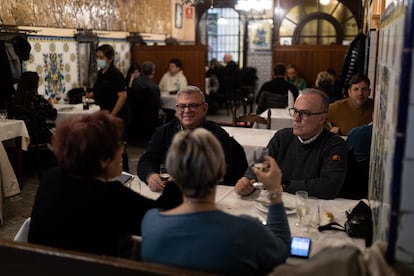‘From 500 reservations there are around 290 left, and everything is up in the air’
At a traditionally peak time in the hospitality sector, restaurants in Barcelona have been plunged into a situation of cancellations and uncertainty, thanks to the regional government’s latest coronavirus restrictions

Three weeks ago, the diaries of many restaurants in Barcelona were practically full with reservations for Christmas Eve, Christmas Day, Sant Esteve (December 26) and New Year’s Eve. But in just a few days, the message from these establishments has gone from “sorry, we are fully booked,” to one of bitter regret over a wave of cancellations. Staff have been working to seek solutions to keep the reservations in place, either by breaking up large groups into smaller tables, or even offering a takeaway service at a discount. “From 500 reservations there are around 290 left, and everything is up in the air,” complains Maria José, the manager of a restaurant called Salamanca, one of the most traditional venues for celebrating the holiday season in the Catalan capital.
She is not the only one to be upset with the situation. Many restaurateurs have been protesting about the damage being done by the latest restrictions put into place in Catalonia by the regional authorities in a bid to slow the sixth wave of the pandemic, which is seeing the omicron variant send infections through the roof. The rules currently in place – each region is in charge of its Covid measures, which require the blessing of the courts – prohibit meetings of more than 10 people, limit capacity in hospitality venues to 50% indoors, and have closed down the nightlife sector entirely.
In Barcelona and other Catalan municipalities with more than 10,000 inhabitants and a 14-day incidence above 250 cases per 100,000 inhabitants, a curfew is in place from 1 to 6am. These restrictions were announced by the Catalan regional government four days before Christmas and went into force at midnight on Thursday night. This coincided with the start of the holiday campaign for hospitality, traditionally one of the busiest times of the year for the sector. The outlook was rosy before the new measures were put into place, thanks to the confidence placed in the vaccination campaign and the introduction of so-called “Covid passports” for entry into venues such as bars and restaurants.
But things have turned out very differently. “What they can’t expect is for people to eat their grapes at midnight [a Spanish tradition on New Year’s Eve, when 12 grapes are eaten as the bells chime] and then have to run off home because there is a curfew,” they say from Salamanca restaurant, where 200 reservations have been canceled for December 31. “It’s a total farce.”
Full fridges, empty tables
The new restrictions have left refrigerators full to capacity but with few patrons to serve. “Things have been even more complicated this year because there are transportation issues, and as there were going to be [trucker] strikes this week, some produce was stockpiled in order to ensure the supply,” sources from the hospitality sector explain. These supply problems have led to prices being raised for some of the usual Christmas dishes, such as lamb. “And now what do we do?” asks another restaurateur.
“We lost 15 reservations in half an hour,” explains Eduard Urgell, the head of An Grup, which has a number of restaurants in Barcelona such as Citrus and El Mussol. “It’s clear that all of these positive cases and restrictions have prompted an exponential growth in cancellations of lunches and dinners in restaurants, just like with the virus.” The same group also has restaurants in Madrid, where the regional government has implemented no such measures.
Urgell won’t go so far as to predict how the Christmas campaign will end, but he does point to the fact that the 50% limit on capacity makes little sense given the number of cancellations being experienced. “The worst thing about these restrictions, because [in Catalonia] we’ve got experience of them, is that they’ve been decided on so abruptly. Now we would settle for half of the reservations to remain in place and for these restrictions to genuinely stay in place for two weeks. It’s a shame, because like other restaurateurs, we had hired extra staff for this campaign,” he adds.
Other restaurateurs don’t even want to talk to the press. Meanwhile, establishments such as Salamanca explain that, as has happened during other periods of restrictions during the pandemic, they will end up cooking food for Cáritas or similar charities, to feed people who are in vulnerable situations.
Tu suscripción se está usando en otro dispositivo
¿Quieres añadir otro usuario a tu suscripción?
Si continúas leyendo en este dispositivo, no se podrá leer en el otro.
FlechaTu suscripción se está usando en otro dispositivo y solo puedes acceder a EL PAÍS desde un dispositivo a la vez.
Si quieres compartir tu cuenta, cambia tu suscripción a la modalidad Premium, así podrás añadir otro usuario. Cada uno accederá con su propia cuenta de email, lo que os permitirá personalizar vuestra experiencia en EL PAÍS.
¿Tienes una suscripción de empresa? Accede aquí para contratar más cuentas.
En el caso de no saber quién está usando tu cuenta, te recomendamos cambiar tu contraseña aquí.
Si decides continuar compartiendo tu cuenta, este mensaje se mostrará en tu dispositivo y en el de la otra persona que está usando tu cuenta de forma indefinida, afectando a tu experiencia de lectura. Puedes consultar aquí los términos y condiciones de la suscripción digital.









































